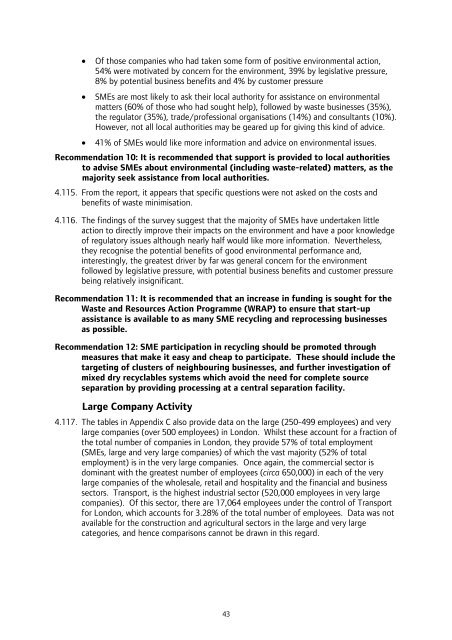London Wider Waste Strategy - London - Greater London Authority
London Wider Waste Strategy - London - Greater London Authority
London Wider Waste Strategy - London - Greater London Authority
Create successful ePaper yourself
Turn your PDF publications into a flip-book with our unique Google optimized e-Paper software.
• Of those companies who had taken some form of positive environmental action,<br />
54% were motivated by concern for the environment, 39% by legislative pressure,<br />
8% by potential business benefits and 4% by customer pressure<br />
• SMEs are most likely to ask their local authority for assistance on environmental<br />
matters (60% of those who had sought help), followed by waste businesses (35%),<br />
the regulator (35%), trade/professional organisations (14%) and consultants (10%).<br />
However, not all local authorities may be geared up for giving this kind of advice.<br />
• 41% of SMEs would like more information and advice on environmental issues.<br />
Recommendation 10: It is recommended that support is provided to local authorities<br />
to advise SMEs about environmental (including waste-related) matters, as the<br />
majority seek assistance from local authorities.<br />
4.115. From the report, it appears that specific questions were not asked on the costs and<br />
benefits of waste minimisation.<br />
4.116. The findings of the survey suggest that the majority of SMEs have undertaken little<br />
action to directly improve their impacts on the environment and have a poor knowledge<br />
of regulatory issues although nearly half would like more information. Nevertheless,<br />
they recognise the potential benefits of good environmental performance and,<br />
interestingly, the greatest driver by far was general concern for the environment<br />
followed by legislative pressure, with potential business benefits and customer pressure<br />
being relatively insignificant.<br />
Recommendation 11: It is recommended that an increase in funding is sought for the<br />
<strong>Waste</strong> and Resources Action Programme (WRAP) to ensure that start-up<br />
assistance is available to as many SME recycling and reprocessing businesses<br />
as possible.<br />
Recommendation 12: SME participation in recycling should be promoted through<br />
measures that make it easy and cheap to participate. These should include the<br />
targeting of clusters of neighbouring businesses, and further investigation of<br />
mixed dry recyclables systems which avoid the need for complete source<br />
separation by providing processing at a central separation facility.<br />
Large Company Activity<br />
4.117. The tables in Appendix C also provide data on the large (250-499 employees) and very<br />
large companies (over 500 employees) in <strong>London</strong>. Whilst these account for a fraction of<br />
the total number of companies in <strong>London</strong>, they provide 57% of total employment<br />
(SMEs, large and very large companies) of which the vast majority (52% of total<br />
employment) is in the very large companies. Once again, the commercial sector is<br />
dominant with the greatest number of employees (circa 650,000) in each of the very<br />
large companies of the wholesale, retail and hospitality and the financial and business<br />
sectors. Transport, is the highest industrial sector (520,000 employees in very large<br />
companies). Of this sector, there are 17,064 employees under the control of Transport<br />
for <strong>London</strong>, which accounts for 3.28% of the total number of employees. Data was not<br />
available for the construction and agricultural sectors in the large and very large<br />
categories, and hence comparisons cannot be drawn in this regard.<br />
43
















